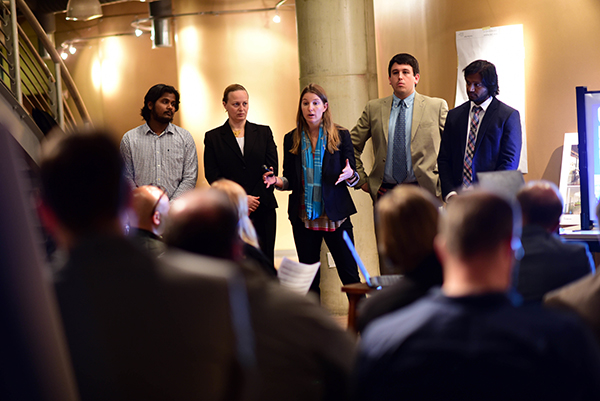
Students in New Product Development in the Hospitality Industry present their idea to an audience of hospitality professionals. The course is one of more than a dozen introduced in the last several years that enable students to apply what they’re learning and gain relevant, real-world experience.
Burkenroad Reports has rightly earned the reputation as one of the nation’s most innovative experiential learning programs, but it’s just one example of active learning at the Freeman School. In recent years, Freeman has introduced a growing number of courses that engage students in the classroom and offer real-world skills for when they graduate.
“We know from research that you get very powerful outcomes when you have experiential learning,” says Ira Solomon, dean of the Freeman School. “For that reason alone, we’ve tried to integrate experiential learning opportunities throughout our curricula and in every area of the school.”
“I think there’s an exciting story to be told about the Freeman School’s strategy around experiential learning,” adds John Clarke, associate dean for graduate programs. “Our experiential courses leverage innovation in pedagogy, innovation in the activities students engage in and innovation in who they engage with. We’re doing a lot of really interesting things, and we’re doing them at both the undergraduate and graduate levels.”
Burkenroad may have been the first, but the Freeman School has actually been developing experiential learning courses for 20 years. The Darwin Fenner Student Managed Fund course was established in 1999 — just six years after Burkenroad’s founding — to give students portfolio management experience by having them invest a $2 million Tulane endowment fund. Under the direction of Professor of Finance Sheri Tice, the students have grown the fund’s value to more $5.8 million spread across three equity portfolios that consistently outperform the benchmark indexes. Four years later, the Freeman School introduced the Trading Center, a $3 million simulated trading floor that enables students to hone their energy trading skills using the same commercial software products used by professional traders.
In 2009, Professor of Practice Sanda Groome began a collaboration with Court Watch NOLA to have the students in her legal studies course act as courtroom monitors. The students go to court and take notes on how judges preside over criminal trials. Those notes are then incorporated into Court Watch reports, which serve as a valuable resource for voters during elections.
The Aaron Selber Jr. Courses in Alternative Investments build on the model established by Burkenroad Reports. The two courses — one focusing on distressed debt and the other on hedge funds — combine academic study and project-based learning, putting students to work analyzing real companies and developing investment strategies to pitch to prospective shareholders.
In 2016, Dean Solomon convened two faculty task forces — one at the graduate level and one at the undergraduate level — to consider the state of business education and what the Freeman School’s role should be. After six months of research and meetings, the Blue Sky Thinking task forces issued their reports, both of which recommended incorporating more courses that feature unique, high impact active learning experiences.
“One of the ways we help students develop what we call earned and justified confidence is by putting them in situations where you can’t control the outcome,” says Mike Hogg, associate dean for undergraduate education. “Whether you want to call it experiential learning or expedition learning, classes that use real data or real-time learning experiences enable students to take the theory they learned and see how it actually plays out in the real world.”
Last January, the Freeman School took a first step toward implementing those recommendations with a new series of intensive
seminars that combine the best of previous experiential courses. Co-taught by Freeman faculty and industry professionals — many of them alumni — the intersession courses offer students a deep dive into selected industries through extensive industry interaction, off-campus excursions and projects that challenge student to apply everything they’ve learned in their core classes.
Last year’s intersession course in commercial real estate development, for example, was taught by real estate veterans Stacey Berger (A&S ’76, MBA ’78) and Dave Sislen (A&S ’78) and featured guest lecturers like Matt Schwartz (BSM ’99), principal of the Domain Cos., and James Maurin (MBA ’73), co-founder of Stirling Properties.
The centerpiece of the course was an investment pitch competition that used as its subject an actual hotel project being developed in New Orleans. The students met the developer, analyzed the project’s financial pro forma and made investment recommendations based on what they’d learned in the course. In addition to real estate, Freeman offered intensive seminars in energy, health care, private equity and law.
Today, 25 years after Burkenroad Reports established the mold, the Freeman School offers dozens of courses that enable students to apply what they’ve learned and gain real-world skills, everything from the Student Venture Accelerator, which helps student entrepreneurs take their ideas from concept to market, to Global Leadership, which puts students to work on consulting projects for international clients, to New Product Development in the Hospitality Industry, which tasks students with developing real new products and services.
“If you just teach people facts, the facts are going to change,” says Dean Solomon. “We want our students to understand the fundamentals, and there’s no better way to learn something than by actually doing it.”

